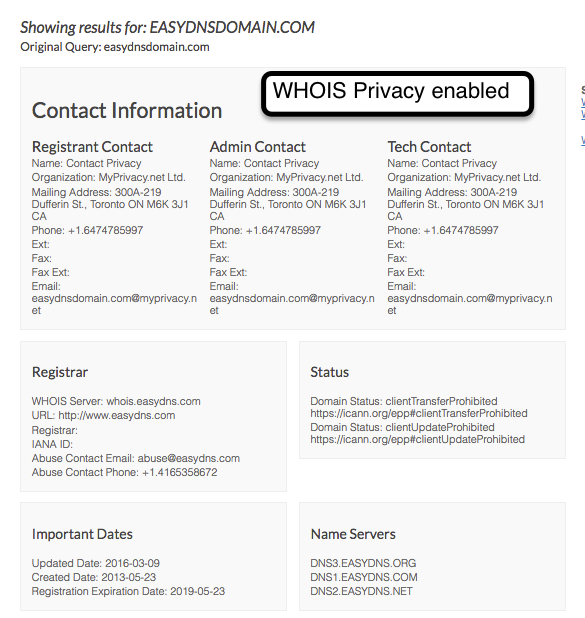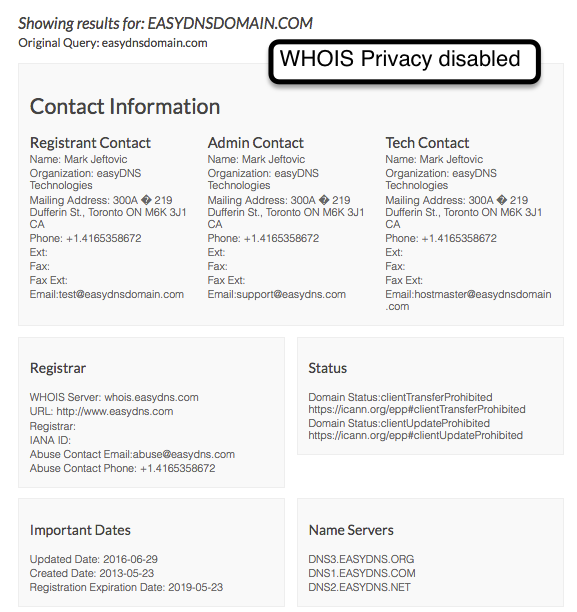| What is WHOIS Privacy?
The information used to register a domain name is stored in what is called a WHOIS database, which can be publicly accessed by anyone performing a WHOIS search. Enabling a feature such as our WHOIS Privacy allows domain owners to make their personal information, such as name, address, and phone number, private. For example:
Users should note that some domain extensions do not allow for privacy of ownership information. For further details regarding what domain extensions we support WHOIS Privacy for, please go HERE and HERE. Depending on the extension, you may also have to contact our support team directly to enable this feature. NOTE: Our WHOIS Privacy feature is currently included with all our service levels at no extra cost EXCEPT DomainPlus. Domains under DomainPlus that wish to have this privacy feature will need to add it as an additional add on. Please see HERE for further details on add ons.
What are the benefits of WHOIS Privacy? There are a number of reasons, political and personal, for people who wish to keep their information private. With phishing, spam and other concerns, it’s become far more common. How much does WHOIS Privacy cost? The fee for the DomainPlus service level is $7.50 per year; for ALL other service levels, Privacy registration is included [no charge!] as an opt-in feature. What are the risks of WHOIS Privacy? ICANN regulations state that the listed registrant is the official owner of a domain. As such, setting that information to that of the registrar (which is the common method of masking personal information) technically transfers ownership to the registrar themselves. What about WHOIS privacy for .CA domains? Whois privacy is handled at the registry level for .CA domains – for individuals, the .CA registry CIRA redacts the information automatically and for corporate registrants, personal information is displayed as a default (there are special circumstances where this will allow redaction of the whois). If you wish to contact a redacted .CA domain holder, you can do so by going to CIRA directly and following the instruction found at this page https://www.cira.ca/ca-domains/contact-a-domain-holder
To enable the WHOIS Privacy feature, please do the following: 1. Log into your easyDNS account. 3. Click on EDIT under the WHOIS PRIVACY section. NOTE: If you do not see a WHOIS PRIVACY section, chances are this feature is currently not available for this domain and will need to be added. Please see HERE for further details on add ons.
4. Choose ENABLED from the dropdown menu list and click on NEXT. 5. Confirm your changes. Your WHOIS Privacy should now be enabled for your domain name. However, please note that this can take a few hours to propagate out Internet-wide.
NOTE: Significant changes to Whois data collection occurred in August 2025. Please visit this page.
What is WHOIS Privacy?WHOIS privacy is a vital service designed to safeguard your personal information when you register a domain name. The WHOIS database acts as a public directory, containing crucial data about domain registrants, such as names, addresses, and contact details. Without WHOIS privacy, anyone can access this information, leading to various privacy concerns.
It’s important to understand WHOIS privacy if you’re an individual or business aiming to maintain your anonymity online while also complying with the rules set by ICANN (the Internet Corporation for Assigned Names and Numbers) and your registrar. What Does WHOIS Stand For?WHOIS stands for “Who is.” It’s the protocol used to access databases that store registered users or assignees of a domain name or an IP address block. By querying this database, you can find information about who owns a domain and the details of its registration. What Information is Included in a WHOIS Record?A WHOIS record holds essential data related to domain registrations. Here are key components typically included:
This information is usually available to the public unless WHOIS privacy protection is in place, which helps keep your personal details secure and private. How Does WHOIS Privacy Work?WHOIS privacy operates by hiding your WHOIS information from public access. There are generally two methods to achieve this:
By adopting WHOIS privacy, your domain registration information is protected, enhancing your security and privacy as a domain owner. How Does WHOIS Privacy Protect Personal Information?WHOIS privacy safeguards your personal information by making sure sensitive data isn’t visible in the public WHOIS database. Specifically, it:
As a domain owner, using WHOIS privacy is a proactive way to protect your personal data online. What are the Benefits of Using WHOIS Privacy?Using WHOIS privacy comes with several key advantages:
In summary, WHOIS privacy is an essential resource for anyone seeking to maintain their privacy online while effectively managing domain registrations. Get HelpIf you have questions about WHOIS privacy or need assistance with domain registration, feel free to reach out to easyDNS for comprehensive support. How Does WHOIS Privacy Work?WHOIS privacy is a key feature offered by various domain registrars. This service helps to protect personal information linked to domain registration. When you register a domain, your details are stored in a public database called the WHOIS database. This records information such as your name, address, email, and phone number. How does WHOIS privacy protect personal information?WHOIS privacy serves as a safeguard for your personal data by limiting what can be accessed publicly. Here’s how it works:
In short, WHOIS privacy protects your personal data from public access, providing reassurance for both individuals and businesses. What are the benefits of using WHOIS privacy?Using WHOIS privacy brings a range of benefits in today’s online world where cybersecurity is critical. Here are some important advantages:
Overall, WHOIS privacy is an essential service for anyone registering a domain, helping to keep sensitive information safe while offering many benefits in cybersecurity. If you need more information about WHOIS privacy or wish to use this important service, get help by contacting us today! WHOIS Privacy RegulationsWHOIS privacy is important for protecting the personal information of people who register domain names. It helps hide details that are usually available in the WHOIS database. The Internet Corporation for Assigned Names and Numbers (ICANN) manages the rules regarding WHOIS data, making sure that domain registrars follow these guidelines. This includes finding a balance between public transparency and individual privacy rights. What are the GDPR requirements for WHOIS privacy?The General Data Protection Regulation (GDPR) brings significant changes to WHOIS privacy, particularly affecting EU citizens. Under GDPR, personal information like names, addresses, phone numbers, and email addresses is protected. Here’s how it works:
These rules highlight the need for privacy and protection of personal data in online spaces. How do these regulations impact domain name registrants?These regulations allow you or your domain registrar to remove publicly available information. Here’s how they affect registrants:
Understanding WHOIS privacy regulations is essential for domain registrants to manage their rights and responsibilities effectively. For more help and information on safeguarding your personal data, don’t hesitate to reach out to easyDNS. |
Knowledge Base
- Search in:







